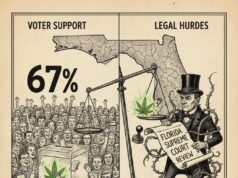The Department of Justice’s recent announcement to reschedule marijuana has significant ramifications for the cannabis industry. While this move doesn’t fully legalize cannabis at the federal level, it could have a profound impact on the tax burdens faced by cannabis businesses.
The Current Tax Landscape
Historically, marijuana has been classified as a Schedule I drug under the Controlled Substances Act (CSA), placing it in the same category as heroin and LSD. This classification has resulted in a significant disadvantage for cannabis businesses when it comes to taxation. Section 280E of the Internal Revenue Code (IRC) prohibits cannabis businesses from deducting ordinary business expenses, such as rent, salaries, and utilities, from their taxable income. This effectively results in a much higher effective tax rate compared to other industries.
The Potential Impact of Rescheduling
If marijuana is rescheduled to a lower category, such as Schedule III, it would no longer be subject to Section 280E. This could lead to a significant reduction in the tax burden for cannabis businesses. By allowing them to deduct ordinary business expenses, the effective tax rate would become more comparable to other industries.
The Economic Benefits
A reduction in the tax burden could have several positive economic consequences for the cannabis industry:
- Increased Profitability: Lower taxes would increase the profitability of cannabis businesses, enabling them to reinvest in their operations, expand, and create jobs.
- Stimulated Investment: A more favorable tax environment could attract greater investment in the cannabis industry, leading to innovation and growth.
- Reduced Barriers to Entry: Lower tax burdens could make it easier for new businesses to enter the cannabis market, increasing competition and potentially lowering prices for consumers.
Conclusion
The rescheduling of marijuana could be a game-changer for the cannabis industry. By reducing the tax burden on cannabis businesses, it could create a more level playing field, stimulate economic growth, and benefit both businesses and consumers.













